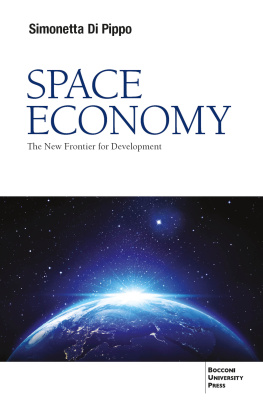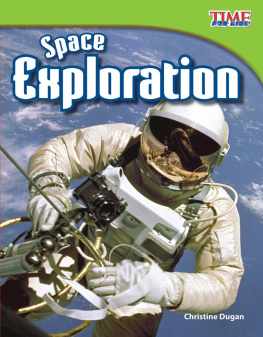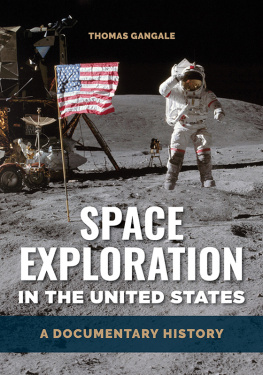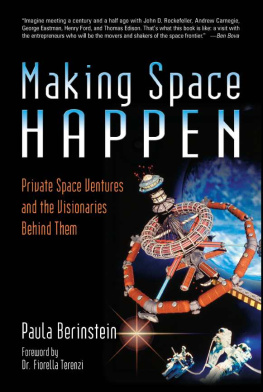1. The New Space Race
Space exploration is a force of nature unto itself that no other force in society can rival. Not only does that get people interested in sciences and all the related fields, [but] it transforms the culture into one that values science and technology, and thats the culture that innovates.
Neil Degrasse Tyson (2012)
There is no longer a definable space race. It ended with the US landing on the Moon and the first human (Neil Armstrong) walking on its surface on July 20, 1969. The space race of the 60s was a clear political and technological race to the Moon between countries representing competing ideologiesdemocracy in the United States and communism in the Soviet Union. It was an exciting and tense time with political overtones and aggressive posturing that threatened the possibility of nuclear war.
Resources were plentiful in the Moon race due to these external geopolitical pressures ($7$9 billion over the 5 years following 1961). Given almost unlimited resources in 60s dollars, it became more of a technological race against time. The endgame was succinctly stated by President Kennedy , in a speech to Congress on May 25, 1961: This nation should commit itself to achieving the goal, before the decade is out, of landing a man on the Moon and returning him safely to Earth. The rest, as they say, is history.
Since the great space race ended, there have been no comparable challenges for the US space program. Progress has continued, but at a slower pace. There have been many achievements and benefits to society from NASA and ESA ventures such as the space shuttle program, the International Space Station, unmanned missions to planets and comets, and the Hubble Telescopes amazing views of the universe, to name just a few. Ambitious new visions are now being posed by commercial endeavors, some in response to prizes offered by NASA. These may not be of the same scale as the 60s space race, but any of these efforts could impact the future of space exploration and contribute to a political advantage in the United States.
The world players in space exploration have changed slightly today, with the traditional superpowers still leading the pack in space effortsthe United States, China, Russia, Japan and the combined European Union. Many national efforts are focused on becoming a regional leader in space technology in order to gain an advantage in Earth science, security and communication. The world situation in some regions is tense, with some countries once again using missiles to demonstrate their military force. In this environment, collaboration among nations is necessary to unite countries in working towards their regional and international goals and prevent any further buildup of aggression in space. Especially as space mining technologies continue to develop, clear operating principles will be needed to prevent strife.
In general, however, momentum is shifting away from national space agencies. The individual faces behind the new space frontier are ambitious businessmen and entrepreneurs. Many grew up as space cadets, in love with the idea of space travel, launching model rockets in the backyard and thinking that they could build their own rockets someday. With start-up companies and support from NASA, the dream is becoming reality. It will be interesting to watch how this combination of NASA, private enterprise, and other partnerships will combine and create an exciting future for us all.
The future of space exploration is bright. The industry is on the verge of exploring a new frontierMars and beyondwith both manned and unmanned missions that will utilize new methods and spacecraft technology developed by a host of new participants. All global citizens will be benefactors of this next phase of Earths journey into outer space.
The Changing Landscape of Outer Space
Over 50 years ago, outer space was seen as the next frontier for humans to investigate and explore. In addition to other benefits, travel into space would give researchers valuable information about our own planet and what lies beyond. High altitude measurement devices could transmit, for example, more accurate weather data and observational images. Not much was known about the outer space environment and whether humans could even survive travel back and forth from space. It truly was an unknown environment filled only with images from science fiction depictions.
The political landscape after World War II became tense with the development of the Cold War. America initially approached space exploration somewhat cautiously so as not too appear aggressive. The USSR, however, did not have the same strategy and instead pushed forward aggressively, launching Sputnik, the first artificial satellite into orbit. The space race was born, and Americans felt and heard the humiliation every 90 minutes as Sputnik passed overhead, beeping in a foreign language. The next 1015 years were filled with a series of space firsts, along with each nations individual successes and failures. The initial rush to explore and dominate outer space was driven more politically than scientifically, and even today, as we move forward into a new age of space development, many of the initiatives are still driven by political motives.
Decades after the space race officially ended, the world today stands at the threshold of a second Space Age and a new type of space race. In the decades after the Moon landing, entire networks of communication and defense satellites were launched, both bringing the world much closer together and placing it under constant surveillance. Humans have lived and worked in outer space for long periods of time, allowing scientists to study long-term effects of experiencing nearly zero gravity aboard space stations. Hundreds of significant experiments have been conducted in laboratories, either in the payload bay of the space shuttle or in space stations, most recently the cooperative effort of the International Space Station. There is now an increased awareness of space debris. So many objects have been placed in orbit around Earth that there is concern about the irreparable damage that satellites or other orbital debris can impact on other spacecraft or stations in orbit. Several countries have participated in both manned and unmanned missions in space, demonstrating a variety of initiatives covering the many facets and applications of outer space exploration.
In the United States, innovative NASA and private sector programs are transforming the space industry. The opportunities for exploration and economic development of the Solar System are expanding. Space technologies have become an integral part of our economytelecommunications, imaging, and global positioning satellites all formed on the basis of over 50 years of research and development by NASA and other government agencies such as the Department of Defense. Over the next decades, NASA will continue to provide the programs and investments necessary to expand our missions farther from Earth.
NASAs next objectives for exploration include visits to asteroids and Mars, tasks involving more complex technologies and planning than any previous space missions. Successful entrepreneurs worldwide have spent millions of dollars to develop systems that are aimed at exploring and exploiting outer space. More than 50 years after NASA was created, its goal is no longer just to reach a destination in outer space but rather to develop the capabilities that will allow Americans to explore and expand their economic horizons beyond Earth. With the combined talents of government and the private sector, the next journeys beyond Earth will come quicker and will integrate new industries and technologies in the process.






